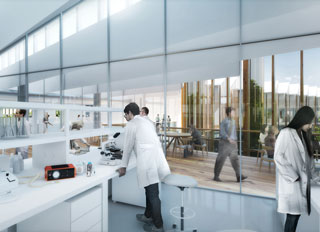 AstraZeneca revealed the proposed designs for its new Global R&D Centre and Corporate Headquarters in Cambridge in the UK. The plans for the new facility, which will be located on the Cambridge Biomedical Campus (CBC), include designs for the Global Centre, an R&D Enabling Building and an Energy Centre.
AstraZeneca revealed the proposed designs for its new Global R&D Centre and Corporate Headquarters in Cambridge in the UK. The plans for the new facility, which will be located on the Cambridge Biomedical Campus (CBC), include designs for the Global Centre, an R&D Enabling Building and an Energy Centre.Key features of the site include:
- Science at the heart – the high technology labs on the site will be separated from other work spaces by glass walls to promote ‘visible science’, ensuring scientific innovation is the primary focus for all staff, both in R&D and other functions.
- Fostering collaboration –the site will feature a number of open spaces and thoroughfares to encourage collaboration not only within AstraZeneca, but also with the wider scientific community within the CBC and beyond.
- Reflecting the character of the City – the unique characteristics of Cambridge’s historic center have influenced the shape of the buildings. The site will be low rise and will include a central courtyard reflecting the colleges of Cambridge University.
- An environmental build –AstraZeneca is seeking Building Research Establishment Environmental Assessment Methodology (BREAAM) Excellent status for the site, which will feature labs that represent best practice in low energy design and the largest ground source heat pump in Europe. “Green Roofs” will also be installed across the majority of the site.
Mene Pangalos, executive vice president, Innovative Medicines & Early Development at AstraZeneca said: “We are very excited to be able to reveal the plans for our new site in Cambridge today. Our aim is to create an open, welcoming and vibrant center that will inspire our teams and partners to push the boundaries of scientific innovation.”
The new site will bring together AstraZeneca’s small molecule and biologics research and development activity, opening up opportunities to exploit the promise of biologics and small molecule combinations. The CBC will be the new UK home for biologics research and protein engineering carried out by MedImmune, AstraZeneca’s biologics arm. MedImmune already employs around 500 people at Granta Park, to the south east of the city.
“With our combined AstraZeneca and MedImmune portfolios we are already uniquely positioned to explore the promise of combination therapies in transforming the way patients are treated,” said Dr. Bahija Jallal, executive vice president, MedImmune. “Our new Global Research Centre in Cambridge will see AstraZeneca and MedImmune scientists working side by side to advance science in our core therapeutic areas. This will support and strengthen our focus on combining the expertise across our business to develop new ways to treat patients and tackle the significant unmet need that exists in areas such as oncology.”
Stefan Marbach, senior partner at Herzog & de Meuron, the architects selected to design the new site in Cambridge, said: “In designing the new building we made reference to the historical colleges in central Cambridge, which are typically low-rise buildings enclosing a central courtyard. The building’s proportions draw on this, as well as the open public access to the courtyard. The whole structure is connected in a single loop, providing short connections within the building and modern, innovative workspaces that support collaborative working. The ‘saw-tooth’ roof, which carries on through to the facade, aims to unify the appearance of the building and give it a distinctive character.”
In advance of the new site coming online in late 2016, around 70 AstraZeneca staff have already relocated to interim facilities in Cambridge, at the Melbourn Science Park, Cambridge Science Park and Granta Park. By the end of 2014 approximately 300-400 AstraZeneca staff will have relocated to the city, to cement important relationships with other members of the Cambridge life science community.
Pangalos continued: “As we carry on our work to get the new site up and running, our focus is on continuing to build important relationships with partners in the local bioscience community. With up to 400 staff relocating to the city by the end of the year, and with the range of exciting collaborations we have underway, Cambridge is already an important part of our innovation footprint here in the UK alongside our sites in the North West, which will continue to be important elements of our UK presence.”
Date: July 17, 2014
Source: AstraZeneca
Filed Under: Drug Discovery




